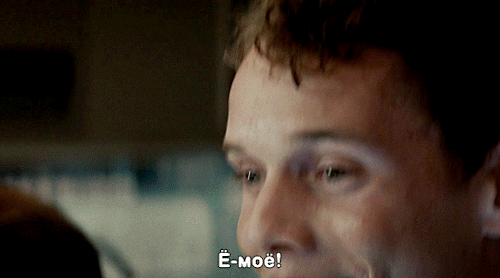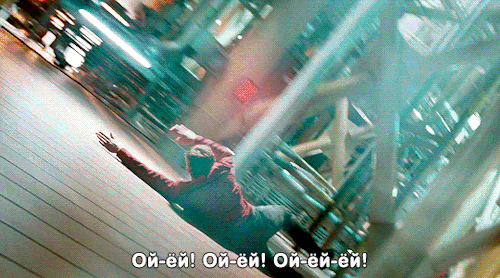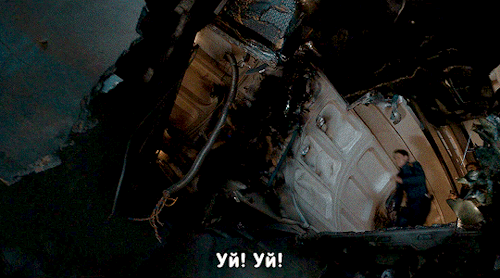“There Are Certain Things In The Movie That Are Very Russian That Is Difficult For An American Audience




“There are certain things in the movie that are very Russian that is difficult for an American audience to pick up on. Like when [Kirk and Sulu] freefall and I capture them and I say something in Russian….[says Russian phrase]…it means “Oh man!” basically, which is something I ad-libbed. Which goes back to what I was saying. Chekov never speaks Russian in the series, and that was Russian slang. And that that is something I decided to add just for the hell of it, because JJ [Abrams] said ‘throw in some Russian, let’s do it for fun.’ It was just a moment that needed some kind of reaction, and they loved it out there. It is one of those things that Russian people get. I think Russian people are very happy with Chekov because he is one of the few Russian characters in American pop culture history that is not the Red Dawn kind of Russians.” — Anton Yelchin
More Posts from Eto-ena and Others
just me trying to teach myself more Russian via Transformers media lmao
haven’t given up on my Russia based TFP AU, I’m just super super busy (end of year is go time for me and oh my god I’m trying so hard to get stuff done so I can just engage fully in Transformers bullshit again lmao)
in the meantime making this ref post for myself because my memory sucks and I don’t want to lose track of my resources lol (and listening to TF in Russian helps me brainstorm ideas for the AU!)
G1
YouTube - Transformers the Movie (1986) in Russian
TFP
YouTube - Episodes in Russian
Cyberverse
YouTube - Hasbro Official Russian Episodes Playlist
Misc.
TFP Russian Language TCG
If anyone has any other TF media in Russian, feel free to let me know! <3
currently I have no Cyrillic keyboard (although I have been looking forever) and my Russian layout keyboard stickers wore down, so typing in Cyrillic is a bit tough at the moment even when changing my keyboard layout input settings and it’s tricky for me to find stuff as my vocabulary isn’t great (yet!!!)
I laughed when I was recently watching an episode of TFP in Russian and the only thing I understood in a scene was Fowler shouting “ya ne ponimayu” (”I don’t understand”) and I was like me too man LOL
I was just serfing the net and came across this video. I really love old educational videos for Russian learners, so I thought I’d share it. (I don’t know why I find the last conversation so funny, but it is)
RUSSIAN TEA VOCAB/ ALL THE NUANCES EXPLAINED

ча́й - the drink itself and a product in the store
ча́йная зава́рка or simply зава́рка - dry tea leaves in the packaging
ча́йный паке́тик - teabag
крупнолистово́й чай - whole-leave grade of tea
чаи́нка (the plural form чаи́нки is more common since usually there is more than one of them in your tea) - fannings, wet pieces of tea leaves or tea dust which fell into the tea
де́лать чай - to make tea. The construction is widely used and describes the process of making tea from any tea product i.e. leaves, tea bags.
ста́вить ча́йник - put on a kettle It is not common to say включи́ть чайник
поста́вь ча́йник = поста́вь во́ду - boil some water in kettle (usually for the tea)
я уже́ поста́вила ча́йник, ско́ро бу́дем пи́ть чай - I’ve already put the kettle on, we’ll have tea soon
зава́ривать (чай) - to brew. One of the steps of the process of tea making (usually from whole-leave grades of tea) when tea leaves are poured with hot water and left for a few minutes in the teapot. The process requires time as tea leaves need time to release natural chemicals. When it is happening the Russians say чай зава́ривается, i.e. the tea is being brewed.
зава́ривать ка́шу (to cook kasha) = to cause a situation that brings about troublesome or unpleasant consequences ну и ка́шу же ты завари́л! - what a mess you’ve made!
but! вари́ть ка́шу = to cook kasha
наста́ивать (чай) - to infuse. The idea of the process of настаивание is to wait longer than usual so the taste becomes strong enough. This verb can be used to explain the same process while preparing herbal teas and infusions.
Remember that this verb has two meanings!!! наста́ивать - to insist
подожди́, чай ещё не завари́лся = подожди́, чай ещё не настоя́лся - wait, the tea is not brewed yet
остужа́ть (чай) - to cool the tea down
электри́ческий чайник/электроча́йник - electric kettle
зава́рочный ча́йник - teapot
ча́шка = кру́жка - cup/mug traditionally ча́шка is the elegant cup with a special design, usually a part of a tea set. Кру́жка (mug) usually has a shape of a cylinder and larger than a regular cup. Now the differences are almost forgotten so you can use any word of your choice when you talk about tableware. But! It is always ча́шка/ча́шечка чая - a cup of tea
блю́дце - saucer
ча́йная ло́жка - teaspoon
ча́йный серви́з - tea set
моло́чник - milk jug
са́харница - sugar bowl
чай с са́харом (мёдом, варе́ньем, молоко́м, лимо́ном) - tea with sugar (honey, jam, milk, lemon)
#russian
i’m a native speaker and never realized that until now omfg
In Russian we don’t say “You’re annoying”, instead we have “ты меня бесишь (ty men'a besish)”, which literally means “You’re turning me into a demon” and this is just too #relatable.
Submitted by @karl-the-not-so-great

The road sign says:
Be the one who makes you happy. Originally it was: "Be with the one who makes you happy", but somehow "with" (c) dimmed.
Interestingly, it works in Russian both with and without C because the instrumental case is needed either way.

Дайте человеку хлеб - и он сыт весь день (Give a man bread and he's full all day long)
Дайте человеку арбуз - и он ссыт всю ночь (Give a man watermelon and he pisses all night)
There is a pun here, the two words sound absolutely the same: - сыт - is full. - ссыт - pisses This is what makes it very funny in Russian.
Vocabulary: сытый (short form: сыт, сыта, сыты) - to be full ссать - to piss (colloquial)
Another funny moment from Evening Urgant! This is an old interview with Milla Jovovich. What is Milla talking about? There are tons of Russian fairy tales about baby goats and wolves. One of the most popular ones is “The wolf and the seven baby goats” (Волк и семеро козлят). However, the one Milla is talking about must be a fairy tale called “Grandmother once had a grey baby goat...” (Жил-был у бабушки серенький козлик...). Here’s the link. It doesn’t have an English translation, but I can try and translate it if you’re interested. https://stihi.ru/2012/08/15/7403 Useful words from this video: Страшный (m.), страшная (f.), страшное (n.), страшные (plur.) - scary; Сказка, сказки (f.) - fairy tale, fairy tales; Лес, леса (m.) - forest, forests; Конец, концы (m.) - end, ends; Сильный (m.), сильная (f.), сильное (n.), сильные (plur.) - strong Interesting fact: Last month, Milla made a video of her reading one of the most well-known Russian fairy tales “Fly Tsokotuha” (Муха-Цокотуха). And again, unfortunately, I could not find the English version of this fairy tale. I can try and translate it, but I cannot guarantee my version won’t be cringeworthy. Here’s the link. https://www.youtube.com/watch?v=a69FMum_nnM&t=249s
Here's another great bit from a Russian TV that I still love with my whole heart. The show "Improvisation" is basically the Russian version of "Whose line is it anyway?". If you want to learn about what the Russian sense of humor is like, this show is a must watch. After watching this video you will remember the word казус (kazus sing., m.) for the rest of your life.

Fun fact: this episode has become iconic and remains a huge meme in the Improvisation fandom (yes, this show has a fandom).
When you listen to an entire song in your target language and one thing makes sense:

ни ра́зу ― not once; never
не раз ― repeatedly
tricky! (from Wiktionary)
-
 ginger-old-wyrm liked this · 1 week ago
ginger-old-wyrm liked this · 1 week ago -
 koalamatcha liked this · 1 week ago
koalamatcha liked this · 1 week ago -
 primmroseitsnotmyrealnamebtw liked this · 1 week ago
primmroseitsnotmyrealnamebtw liked this · 1 week ago -
 creaking-skull liked this · 1 week ago
creaking-skull liked this · 1 week ago -
 genderdotcom liked this · 1 week ago
genderdotcom liked this · 1 week ago -
 wyllzel reblogged this · 1 week ago
wyllzel reblogged this · 1 week ago -
 wyllzel liked this · 1 week ago
wyllzel liked this · 1 week ago -
 shizuoi reblogged this · 1 week ago
shizuoi reblogged this · 1 week ago -
 gianteffingnerd liked this · 2 weeks ago
gianteffingnerd liked this · 2 weeks ago -
 humblespring liked this · 1 month ago
humblespring liked this · 1 month ago -
 phillipbrooks reblogged this · 1 month ago
phillipbrooks reblogged this · 1 month ago -
 notunaltered liked this · 1 month ago
notunaltered liked this · 1 month ago -
 instantezra liked this · 1 month ago
instantezra liked this · 1 month ago -
 andyridgeley reblogged this · 1 month ago
andyridgeley reblogged this · 1 month ago -
 velveteencryptid liked this · 1 month ago
velveteencryptid liked this · 1 month ago -
 sugarandspicer liked this · 1 month ago
sugarandspicer liked this · 1 month ago -
 near-babylon reblogged this · 1 month ago
near-babylon reblogged this · 1 month ago -
 near-babylon liked this · 1 month ago
near-babylon liked this · 1 month ago -
 cozycoffee liked this · 1 month ago
cozycoffee liked this · 1 month ago -
 fidelius-dt liked this · 1 month ago
fidelius-dt liked this · 1 month ago -
 fluidstatick reblogged this · 1 month ago
fluidstatick reblogged this · 1 month ago -
 pulvis--sidereus reblogged this · 1 month ago
pulvis--sidereus reblogged this · 1 month ago -
 cactuskizzy liked this · 1 month ago
cactuskizzy liked this · 1 month ago -
 purlturtle reblogged this · 1 month ago
purlturtle reblogged this · 1 month ago -
 purlturtle liked this · 1 month ago
purlturtle liked this · 1 month ago -
 chillin-in-the-corner reblogged this · 1 month ago
chillin-in-the-corner reblogged this · 1 month ago -
 nopenotdoingthisstuff liked this · 1 month ago
nopenotdoingthisstuff liked this · 1 month ago -
 niftybottle reblogged this · 1 month ago
niftybottle reblogged this · 1 month ago -
 lesbian-empress-of-hell reblogged this · 1 month ago
lesbian-empress-of-hell reblogged this · 1 month ago -
 keykid-from-arendelle reblogged this · 1 month ago
keykid-from-arendelle reblogged this · 1 month ago -
 keykid-from-arendelle liked this · 1 month ago
keykid-from-arendelle liked this · 1 month ago -
 nerdsbianhokie reblogged this · 1 month ago
nerdsbianhokie reblogged this · 1 month ago -
 brobenedick liked this · 2 months ago
brobenedick liked this · 2 months ago -
 hartford-hereford-hampshire reblogged this · 2 months ago
hartford-hereford-hampshire reblogged this · 2 months ago -
 simpledontmeanpeachy reblogged this · 2 months ago
simpledontmeanpeachy reblogged this · 2 months ago -
 joanthangroff reblogged this · 2 months ago
joanthangroff reblogged this · 2 months ago -
 nales reblogged this · 2 months ago
nales reblogged this · 2 months ago -
 thecolorofthegame liked this · 2 months ago
thecolorofthegame liked this · 2 months ago -
 jakeluppin reblogged this · 2 months ago
jakeluppin reblogged this · 2 months ago -
 bisupergirl liked this · 2 months ago
bisupergirl liked this · 2 months ago -
 aspacewar liked this · 3 months ago
aspacewar liked this · 3 months ago -
 maikanto reblogged this · 3 months ago
maikanto reblogged this · 3 months ago -
 despite-everything liked this · 3 months ago
despite-everything liked this · 3 months ago -
 lunacornfan2k25 reblogged this · 3 months ago
lunacornfan2k25 reblogged this · 3 months ago -
 theamazingrin reblogged this · 3 months ago
theamazingrin reblogged this · 3 months ago -
 isenstar777 reblogged this · 3 months ago
isenstar777 reblogged this · 3 months ago -
 threatenedwithaspoon reblogged this · 3 months ago
threatenedwithaspoon reblogged this · 3 months ago

actually, we don't call it russian, we simply call it cheeki-breeki
106 posts